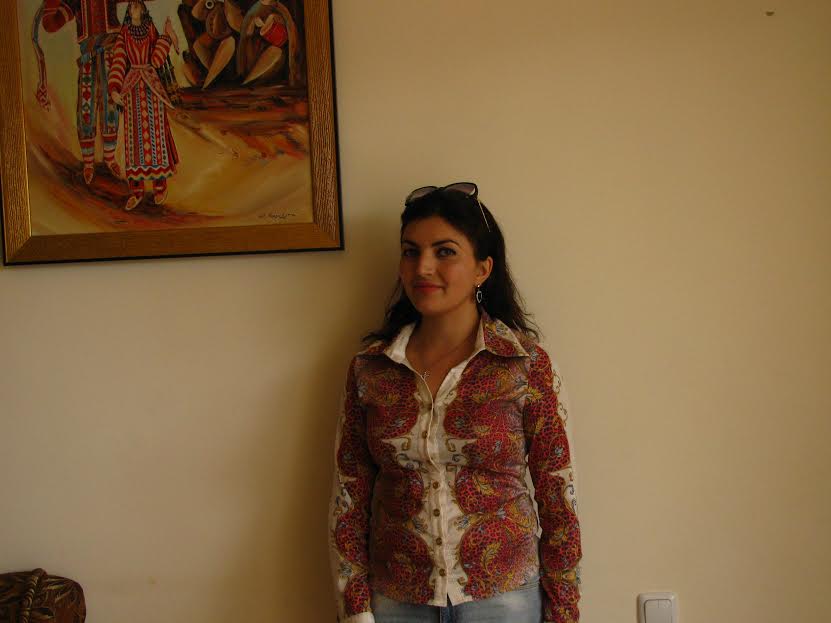Native studies teacher: “I believe the “Ari Tun” Program is a very important and successful program and don’t share any negative views”

To make the daily activities at the camping event held through the “Ari Tun” Program more substantial and goal-oriented, in addition to Armenian songs and dances, the participants also take native studies courses during which they are introduced to Armenian history and literature, gain new knowledge and learn Armenian poems, proverbs and sayings. In an interview with Hayern Aysor, my interlocutor, teacher of the native studies courses at the camp, teacher of Armenian language and literature at the school named after freedom fighter from the Kakavadzor village of Aragatsotn Province Mesrop Mkhitaryan, Ani Sadoyan said this wasn’t the first time she was teaching Armenian and holding native studies courses during the “Ari Tun” Program.
Hayern Aysor: How did you hear about the program and how was it that you participated in the native studies courses?
Ani Sadoyan: I heard about the “Ari Tun” Program from Never Virabyan, the lecturer of the educational experience program for my Master’s degree in 2015. I took his advice and decided to submit a plan to the Ministry of Diaspora of the Republic of Armenia. The plan was approved, and I became engaged in the courses. Last year, I only participated in the Armenian language courses held at Stepan Shahumyan Primary School in Yerevan. This year, I have been holding native studies courses at the “Ari Tun” Camp starting from the third stage of the “Ari Tun” Program.
Hayern Aysor: The new school year is approaching. It is safe to say you didn’t relax during the summer and will soon be going to school to teach again. Haven’t you lost energy? Isn’t it hard?
A. S.: Teaching is a big responsibility, but it has always been a pleasure for me. I can’t say that I have only worked. I relax and work at the same time. Not only the children, but we also make new friends. I have become friends with other teachers with an in-depth and interesting inner world. We have gained as much energy as we have lost.
Hayern Aysor: What was it that was difficult and uncontrollable for the children?
A. S.: There was no such problem. They are only active on the first day. After that, they pull themselves together and treat their lesson seriously.
Hayern Aysor: Not all the young Diaspora Armenians have full command of the Armenian language. Many have trouble understanding the language, and there are also young Armenians who don’t know Armenian at all. What do you do in such cases in the classroom?
A. S.: The majority of them know the language. There were only three students who didn’t know Armenian in this last stage. In such cases, I do my best to translate the words and phrases with the help of their friends.
Hayern Aysor: Can you remember any extraordinary event that took place during the camping event?
A. S.: Yes, there have been such cases that have left a great impression on me. In the sixth stage, there was an Armenian boy from Germany. He would tell me that his only dream is to live in Armenia and that he keeps asking his parents to move to the Homeland. On the day of the farewell bonfire, he was crying so much that even I got emotional. Another boy was almost screaming that even if his parents don’t allow it, he will escape and come to serve in the Armenian Army.
Hayern Aysor: What did you get out of these courses and your contacts with the young Diaspora Armenians as a teacher?
A. S.: I have great impressions. I admire the level of development, awareness and high level of patriotism of the young Diaspora Armenians. Unlike the young Armenians in Armenia, they are free and aren’t shy to express their views and ideas. I would like to see the children attending schools in Armenia’s villages to be able to express their thoughts and ideas as freely as them. I believe the “Ari Tun” Program of the RA Ministry of Diaspora is a very important and successful program.
Hayern Aysor: Thank you, Ani! I wish you success in the coming school year.
Karine Avagyan




 Արևելահայերեն
Արևելահայերեն Արևմտահայերեն
Արևմտահայերեն Русский
Русский






